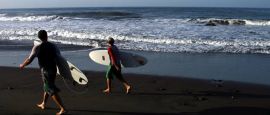El Salvador History, Language and Culture
History of El Salvador
By the mid 1520s, a Spanish expedition to El Salvador had established a settlement named San Salvador, defeating the indigenous Pipil people who had previously occupied the region. The territory of El Salvador later became part of the Kingdom of Guatemala, but Salvadorans strongly objected to the Guatemalans' plan to incorporate the territory into the Mexican Empire.
In 1824, after a brief war and having established its own constitution, El Salvador became one of the United Provinces of Central America (later the Federal Republic of Central America).
Nonetheless, it was several decades before El Salvador was able to rid itself of the overwhelming influence of Guatemala. This came about largely through the influence of the coffee barons, who dominated El Salvador until the 1920s, and the military, which had by then entered the political arena.
Economic problems blighted the country from the 1950s to the 1970s, with a brief diversion provided by the 1969 Soccer War with Honduras (essentially a border dispute). The 1980 assassination of Archbishop Oscar Romero – a leading critic of civil rights abuses – by right-wing elements, saw El Salvador plunge into civil war.
As the war spread throughout the country in the 1980s, the government received huge amounts of US military and civil aid, with which it fought a brutal and fairly effective counter-insurgency campaign against leftist guerrillas of the Farabundo Marti Liberation Front (FMLN). Peace talks began in earnest in 1989, and a formal ceasefire, under UN auspices and supervised by a joint forum of the two sides, came into force at the beginning of 1992.
It was not until the 2000 National Assembly election that the FLMN became the largest party. Political differences were temporarily set aside in January 2001, when the country was struck by a massive earthquake, which killed several thousand and left tens of thousands homeless.
In 2009, Mauricio Funes, a former television journalist, became the first president from the FMLN party. He has presided over a number of key social reforms including the abolition of end-user fees for public health care, and the introduction of free shoes, clothes and meals for schoolchildren. Opponents point out that crime has not abated and the countrywide murder rate remains one of the highest in the world.
Did you know?
• Archbishop Oscar Romero, who was assassinated in 1980, was declared a martyr by Pope Francis in 2015.
• The infamous Mara Salvatrucha (MS-13) street gang originated in Los Angeles, where many Salvadorans fled during the civil war.
• The nickname for Salvadorans is guanacos, a relative of the llama, though the name may also derive from the indigenous word for ‘brotherhood’.




 You know where
You know where